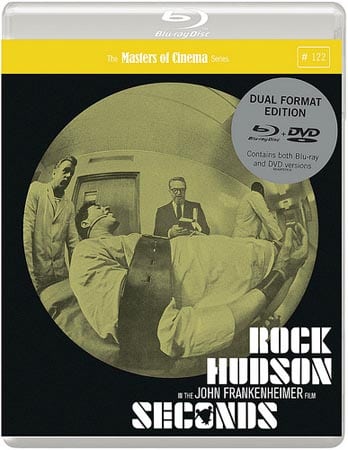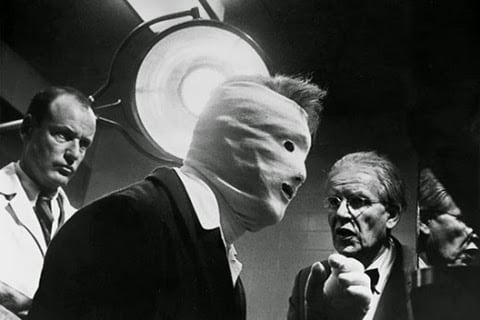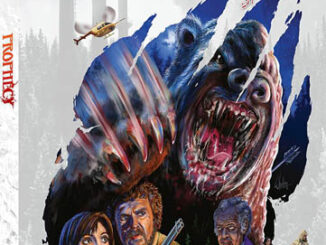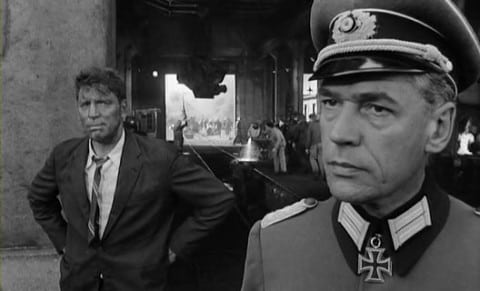Seconds (1966)
Directed by: John Frankenheimer
Written by: David Ely, Lewis John Carlino
Starring: Jeff Corey, John Randolph, Rock Hudson, Salome Jens
USA
AVAILABLE ON DUAL FORMAT BLU-RAY AND DVD: NOW, from EUREKA ENTERTAINMENT
RUNNING TIME: 107 min
REVIEWED BY: Dr Lenera, Official HCF Critic
Arthur Hamilton is a middle-aged man whose life has lost purpose. He has achieved success in his career, but finds it unfulfilling. His love for his wife of many years has dwindled, his only child is married and he seldom sees her. Then one of his old and supposedly dead friends starts calling him at home. He encourages Arthur to visit the office of a company specializing in procedures that allow its customers to reinvent their lives. Not being entirely certain what he is being offered, he’s blackmailed to sign a contract that quickly drains his bank account and give the company the power to literally take over his life. He gets a complete makeover and the new Arthur that emerges from the company’s office is younger, slimmer, and with a new name, Antiochus ‘Tony’ Wilson….
I quite enjoyed this year’s Self/less, and it’s acceptable as a more action orientated, happier version of the same premise as Seconds, but all I could do whilst watching it was compare it adversely to John Frankenheimer’s film, even though I hadn’t actually seen it for about twenty years. I did, though, have vivid memories of bits and pieces of it, in particular its ending which haunted me for days, and which I should have known would never be replicated in a modern-day variant of its story. Seen again today, Seconds, which is, reduced to its most basic level, a variant on Faust [man sells his soul not to the Devil but a corporation, and don’t lots of people do that all the time?], most definitely holds up. This is perhaps partly because its premise is becoming more and more believable, though why then, ignoring the matter of the ending, didn’t Self/less have anywhere near the same resonance? The answer, I think, is not so much because Seconds is so stylishly shot, but because it remains focused on ideas rather than thrills, delving quite deeply into the philosophical aspects of its premise and, in the process, asking us important questions about life itself. Seconds doesn’t really try to be exciting – much of it consist of dialogue scenes – but it does have a superbly achieved paranoid atmosphere which seeps into even the ‘brighter’ sections, and it’s also quite moving without really lapsing into sentimentality.
The third film of in Frankenheimer’s unofficial ‘paranoia trilogy’ also comprising The Manchurian Candidate and Seven Days In May, Seconds was based on a novel by David Eli, which screenwriter Lewis John Carlino followed relatively closely. It saw Frankenheimer working with legendary cinematographer James Wong Howe who said of the director, though [I’m becoming more or less one myself] would probably disagree: “I don’t think John really understands dramatic values; he’s more or less mechanically inclined: lenses and camera and that. All that’s my job; he ought to worry about the story and the actors”. Frankenheimer originally wanted the Arthur Hamilton/Tony Wilson role to be played by one actor with makeup, with Kirk Douglas and Lawrence Olivier [both of whom would have been too old], then Rock Hudson’s agent convinced him that Hudson would be good, though Hudson said that he’d only play the Tony role. Frankenheimer cast John Randolph, an actor who had been on the black list of supposed Communist sympathisers fifteen years, in the role of Arthur. Hudson spent so long shooting a party sequence that he was genuinely drunk during the final take, while several shots of a real operation were inserted into the surgery scene. Frankenheimer cut down the final scene to make Tony’s final vision/memory more ambiguous, while an orgy scene had to be re-edited to remove all nude shots but was later restored. He wanted to put back in a deleted scene where Arthur visits his daughter, but the footage could not be found. Seconds was something of a commercial flop, though its increased reputation in later years caused Frankenheimer himself to say about Seconds that it’s the only movie of his: “that’s ever gone from failure to classic without ever having been a success.”
Seconds gets off to a very disorientating start with the opening titles taking place over distorted shots of parts of a face [the brilliant Saul Bass working his magic again], while Jerry Goldsmith’s rather harrowing music, based on musical ‘seconds’ rather than minor thirds, major fifths etc., and which makes dramatically ironic use of organ, also contributes to the feel. The first scene introduces Arthur making his way through a train station which mainly intercuts handheld point-of-view shots with close-ups of his face, and I must warn you right now that throughout the film Howe’s cinematography is often quite odd and even jarring as it proceeds to break a lot of the so-called rules concerning editing, shot choices etc, though actually a lot of modern filmmakers seem to attempt to do similar things, only that they tend not to pull it off nearly as well and the result is often just an incoherent mess. Frankenheimer and Howe know exactly what they’re doing; they’re enhancing the edgy atmosphere and making points about certain scenes. An early chat between Arthur and wife, for example, is played out firstly in claustrophobic close-ups, then in a lengthy long distance shot of the couple facing away from us sitting on a bed, emphasising very well the lack of feeling and aridity of the marriage and their lives. Often the camera is attached to people as they walk about, and there’s even a bit of what is now called ‘shakycam’ in a few scenes, though it doesn’t result in an incomprehensible, headache causing, eye hurting blur as in many films today, where it seems to be used especially often in action so the filmmakers don’t have to stage things properly.
We immediately sympathise with Arthur and his plight, partly because many of us feel or will feel like him some day. The film quickly gets him to the headquarters of ‘The Company’, a short van ride from a meat packing plant [and as I type this I’ve just had a horrible thought about the plot which I won’t put down!], and there’s already a sinister, even Kafka-esque feel to many of these scenes, from nobody looking at Arthur as he turns up at the first location, to a room full of seated individuals with no identity or rights, totally at the mercy of The Company. Arthur is drugged so he’ll attack a girl and can therefore be blackmailed to go ahead with his transformation [I guess The Company already think he’s seen too much], a scene simply but very effectively realised with distorted lenses, then undergoes his operation. There’s no sense of release afterwards. When Arthur wakes up as Tony, he can’t speak at first and his face is covered by a mask. Later, he’s not only very scarred for a while but still looks old in places. Frankenheimer and Carlino do their best to make the proceedings believable, and generally succeed. What I found especially interesting is that they don’t really allow Arthur to have much happiness as Tony. Tony feels constantly unsure of things; who he is, his new life, the moral issues of what has been done. He’s given a romance, but even that feels tense, edgy, not quite right. Rock Hudson, rarely normally an actor of much note to my eyes, is so good here!
Seconds slips a bit around the middle, notably during a lengthy outdoor winemaking party/orgy sequence which just goes on forever without really making much of a point, but it’s followed immediately by another party, where a drunken Tony starts blabbing about his past life, which ends on a chilling revelation, taking the story into Invasion Of The Body Snatchers territory. That genuinely nightmarish ending still packs a tremendous punch, though this time around just as powerful to me, though in a far quieter way, was a scene where Tony visits Arthur’s [or rather his] wife and is told by her that Arthur had been basically dead to her years before his body was found in a [staged by The Company] hotel fire. It’s just so sad; in fact the whole film, in some ways a study of a man who can’t find seem to find himself in any sort of reality, and only seems to realise what he wants when it’s too late, reeks of sadness and despair, which makes it not the most enjoyable watch but one that is very compelling and, like much of the best science fiction, often hits home with themes that are always relevant. You could see Seconds as a warning against soulless materialism, and against the idea of the grass being greener on the other side of the fence”, that you never realise how good you actually have it, and if your life doesn’t seem good enough then you should work on making it better instead of abandoning it and the people who love you. But I also took from it the increasingly pertinent – especially in our digital age – idea that our lives, including even our identities, can be controlled by greater forces, and that our world is largely built on falsehoods. That man Frankenheimer was often on to something, though of course one shoudn’t forget Ely and Carlino for writing such a meaningful tale.
Hudson is quite simple a revelation, so convincing does he transmit the feeling of being uncomfortable in one’s skin, but Randolph is also very strong as the weary Arthur, and he does look a bit like an older, paunchier Hudson in a truly excellent piece of casting. Some memorable faces from previous Frankenheimer films turn up including The Manchurian Candidate’s Khigh Dhiegh who again gets to utter his that creepy laugh. Goldsmith’s score expertly balances a real feeling of horror [without giving in to more conventionally ‘over the top’ horror music] with passages of tenderness and just a touch of very black humour. If I had written Seconds, I would have given Tony some more moments of light before the darkness begins to fall, I would have filled in some of the questions revolving The Company, and I really don’t think I would have gone for such an upsetting ending, but all this would have made the film less unique. Bleak and uncompromising, Seconds may not entertain all of the time, but it surprises, shocks, and really makes one think.
Rating: 









Seconds comes to Region B Blu-ray in an excellent print, from the same 4k scan/2k transfer which Criterion used, with outstanding depth and clarity. Blacks seem especially strong. They have added a hugely informative commentary to the one by Frankenheimer used on the old DVD, and good old Kim Newman appears again to talk about the film and its place in Frankenheimer’s canon.
SPECIAL FEATURES:
*Gorgeous restoration from a 4K transfer, in 1080p HD on the Blu-ray
*Two Feature-length audio commentaries: one by director John Frankenheimer, and one by film scholar Adrian Martin
*New video interview with novelist and critic Kim Newman
*Optional English subtitles for the deaf and hearing-impaired
*Original theatrical trailer
*Booklet featuring new essays by critics David Cairns and Mike Sutton







Be the first to comment